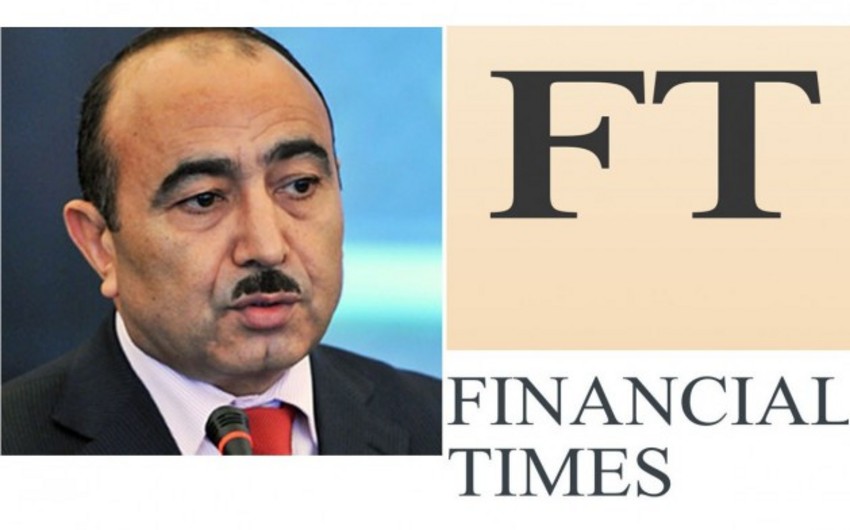Baku. 12 February. Azerbaijan distanced itself on Wednesday from growing demands in the US to arm Ukraineagainst pro-Russian separatists, a stance reflecting concern in Baku about the conflict’s potential impact on national security and domestic stability.
“In general, Azerbaijan is against military forms of solving conflicts. We believe that in the present world there are more powerful tools for solving conflicts than military ones,” Report informs, the Head of the Azerbaijani Presidential Administration's Public and Political Issues Department, Ali Hasanov told the Financial Times in an interview. Report News Agency citing the text:
"Azerbaijan avoids aligning itself explicitly either with the west or with Russia in its foreign policy, but it joined western countries at the UN last year in voting for a resolution that rejected Russia’s annexation of Crimea and supported Ukraine’s territorial integrity", he says.
Mr Hasanov said. Azerbaijan was disappointed that western governments had not taken an equally firm stand against Armenia’s seizure, in a war in the early 1990s, of the enclave of Nagorno-Karabakh and seven other districts located in Azerbaijan.
“Our objection is to the double standards in the west on this issue. In one conflict the west calls them separatists, in the other they don’t,” Mr Hasanov added.
Mr Hasanov blamed a recent spate of violent incidents between Armenian and Azerbaijani forces on “internal forces in Armenia who are trying to strengthen their positions”.
He suggested that the US and its allies should take action to eject Armenia from international bodies, such as the Council of Europe and the Organisation for Security and Co-operation in Europe.
Ukraine’s conflict poses awkward choices for the authorities in Baku, who were disturbed both by the pro-democracy revolution in Kiev a year ago and by the Russian retaliation. Mr Aliyev and his government regard the preservation of national independence — achieved from the Soviet Union only 24 years ago — and domestic political peace as their supreme priorities.
Tensions emerged in Baku’s relations with the US last year as the authorities tightened domestic political conditions and clamped down on independent media in a country where opponents of Mr Aliyev’s government were already allowed little scope.
However, Mr Hasanov struck a conciliatory note towards the US, emphasising Baku’s co-operation with Washington on counter-terrorism and energy, and blaming disagreements over human rights on non-governmental organisations based in the US rather than on the American government itself.
“Unfortunately, there are forces who use these incidents to cause a deterioration in US-Azerbaijani relations and to undermine the image of Azerbaijan. But other than that, Azerbaijan is committed to its strategic partnerships with western countries,” he said.
Mr Hasanov noted that Azerbaijan shared a problem with western countries in that about 300 Azerbaijanis had gone to fight in Syria with Islamist extremists, posing a potential security threat upon their return home.
“Some forces want to see Azerbaijan as a radical fundamentalist country. Some forces are intent on undermining the secular path of Azerbaijan,” he said.
According to sketchy reports in the Azerbaijani media, a number of citizens have been arrested for fighting in Syria under a stricter antiterrorism law adopted in March 2014.
“I think a few hundred citizens of western countries going to the region is probably less dangerous than a few hundred Azerbaijanis going there,” Mr Hasanov said, alluding to Azerbaijan’s relatively small population of 9.5m.
Mr Hasanov said the government was confident it could ride out the effect of sharply falling oil prices on its budget and development plans, partly because it was introducing new taxes on bank deposits, property sales and luxury items such as imported cars.
He stressed that no new taxes would be imposed on the private, non-oil sector of the economy because the government understood the importance of letting this sector thrive.
He ruled out an abrupt devaluation of the manat, Azerbaijan’s currency, but said the government was considering a managed downward adjustment in line with the euro, which has been falling against the dollar.


 https://static.report.az/photo/d469431c-99bc-4096-a8f5-a0be8f552f4d.jpg
https://static.report.az/photo/d469431c-99bc-4096-a8f5-a0be8f552f4d.jpg

